Business Ethics Assessment 3: Structured Reflection Report
VerifiedAdded on 2022/11/14
|8
|1592
|256
Report
AI Summary
This report, written by a student, is a structured reflection on business ethics, addressing key concepts and principles. The report begins by defining business ethics and corporate social responsibility, emphasizing the significance of ethical principles and the role of integrity in decision-making. It then explores the application of ethical values, including the Deontology theory, in various business contexts. The report further examines ethics in international business, highlighting the importance of aligning business practices with global standards and the Integrative Social Contract Theory. Finally, it delves into the application of moral values, discussing moral imagination and the significance of personal values, particularly integrity, in fostering an ethical work environment. The student uses the assignment to reflect on course learnings and demonstrates an understanding of corporate social responsibility, business ethics, and the value of integrity in decision-making, with references to academic sources.
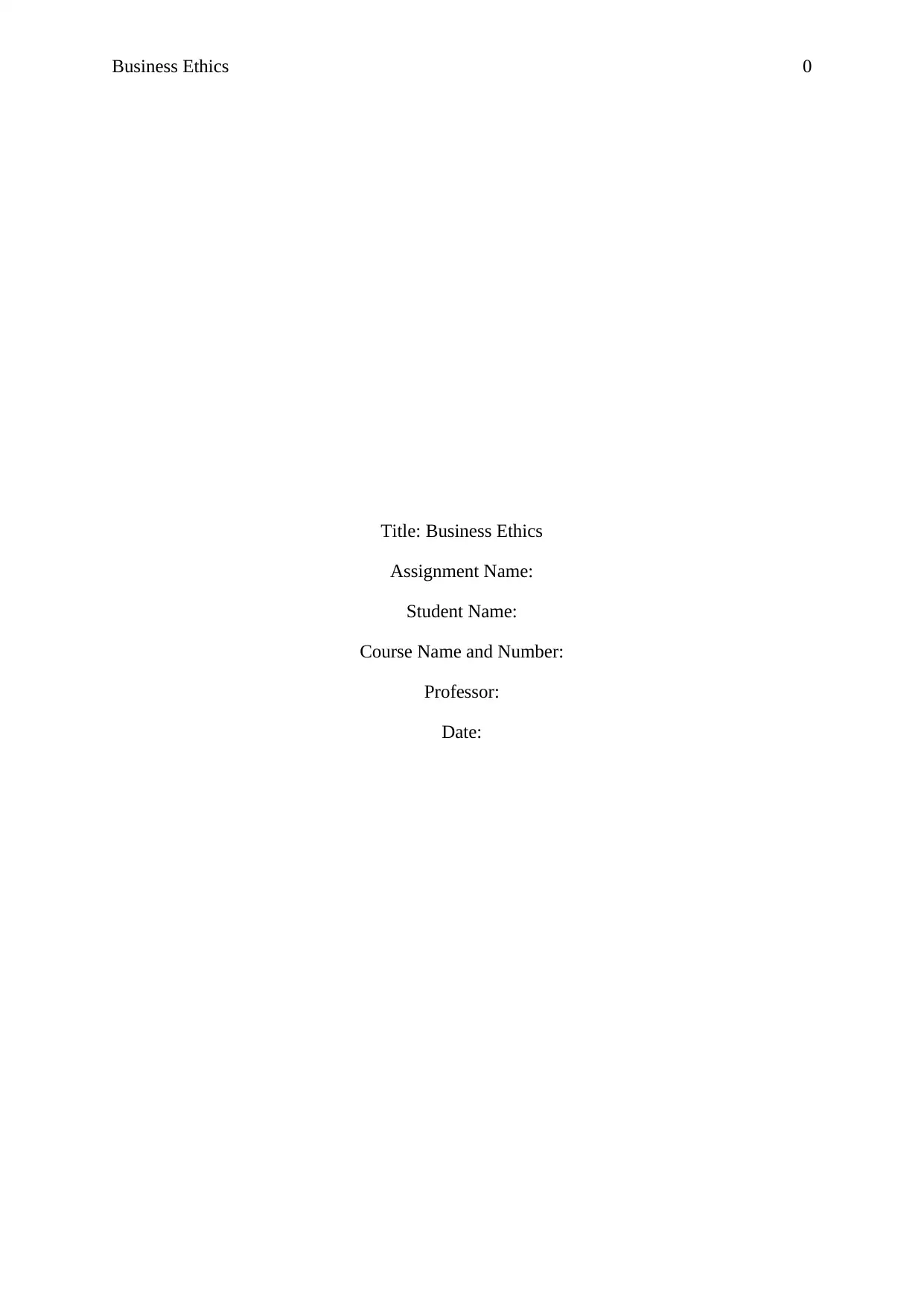
Business Ethics 0
Title: Business Ethics
Assignment Name:
Student Name:
Course Name and Number:
Professor:
Date:
Title: Business Ethics
Assignment Name:
Student Name:
Course Name and Number:
Professor:
Date:
Paraphrase This Document
Need a fresh take? Get an instant paraphrase of this document with our AI Paraphraser
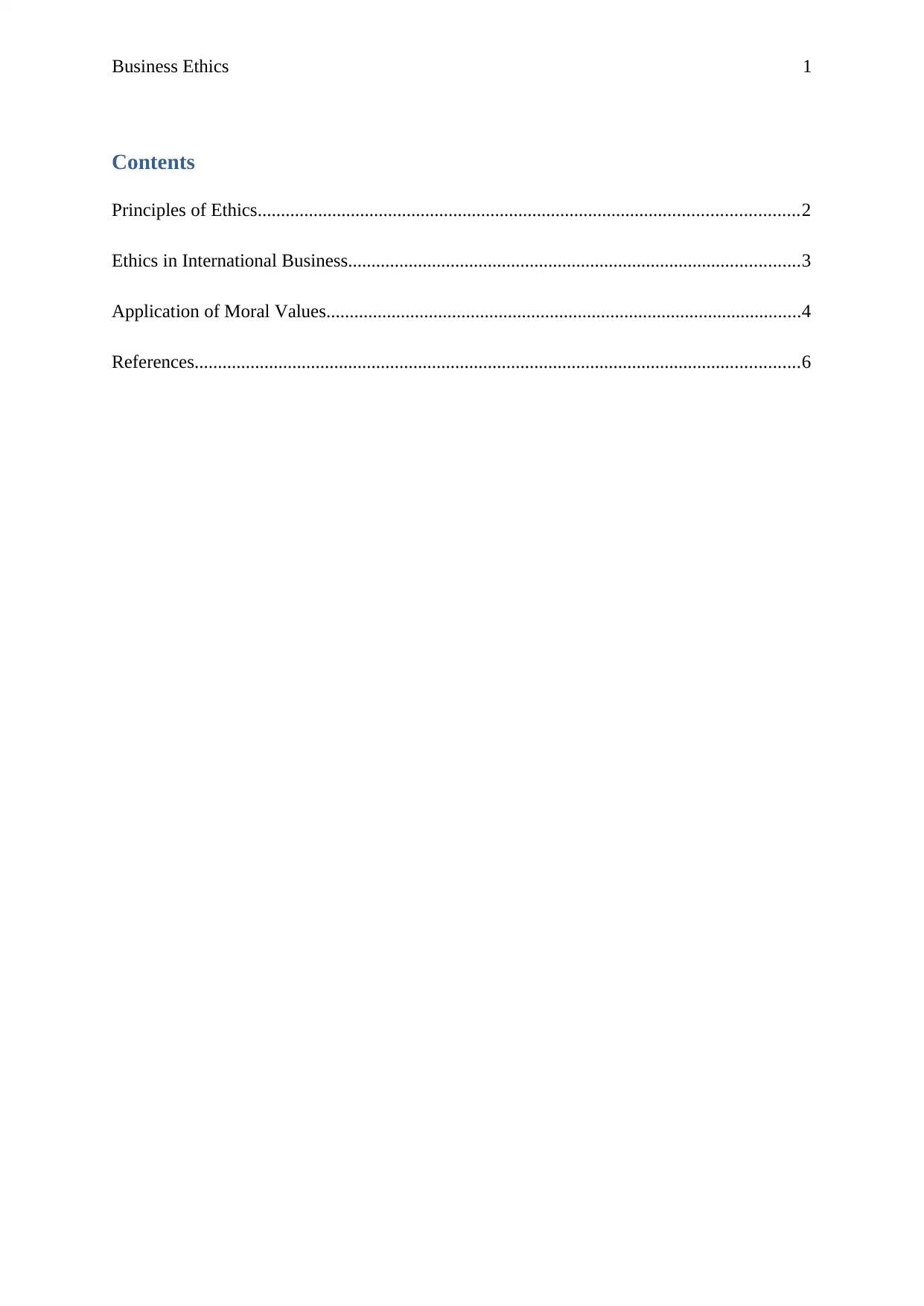
Business Ethics 1
Contents
Principles of Ethics....................................................................................................................2
Ethics in International Business.................................................................................................3
Application of Moral Values......................................................................................................4
References..................................................................................................................................6
Contents
Principles of Ethics....................................................................................................................2
Ethics in International Business.................................................................................................3
Application of Moral Values......................................................................................................4
References..................................................................................................................................6
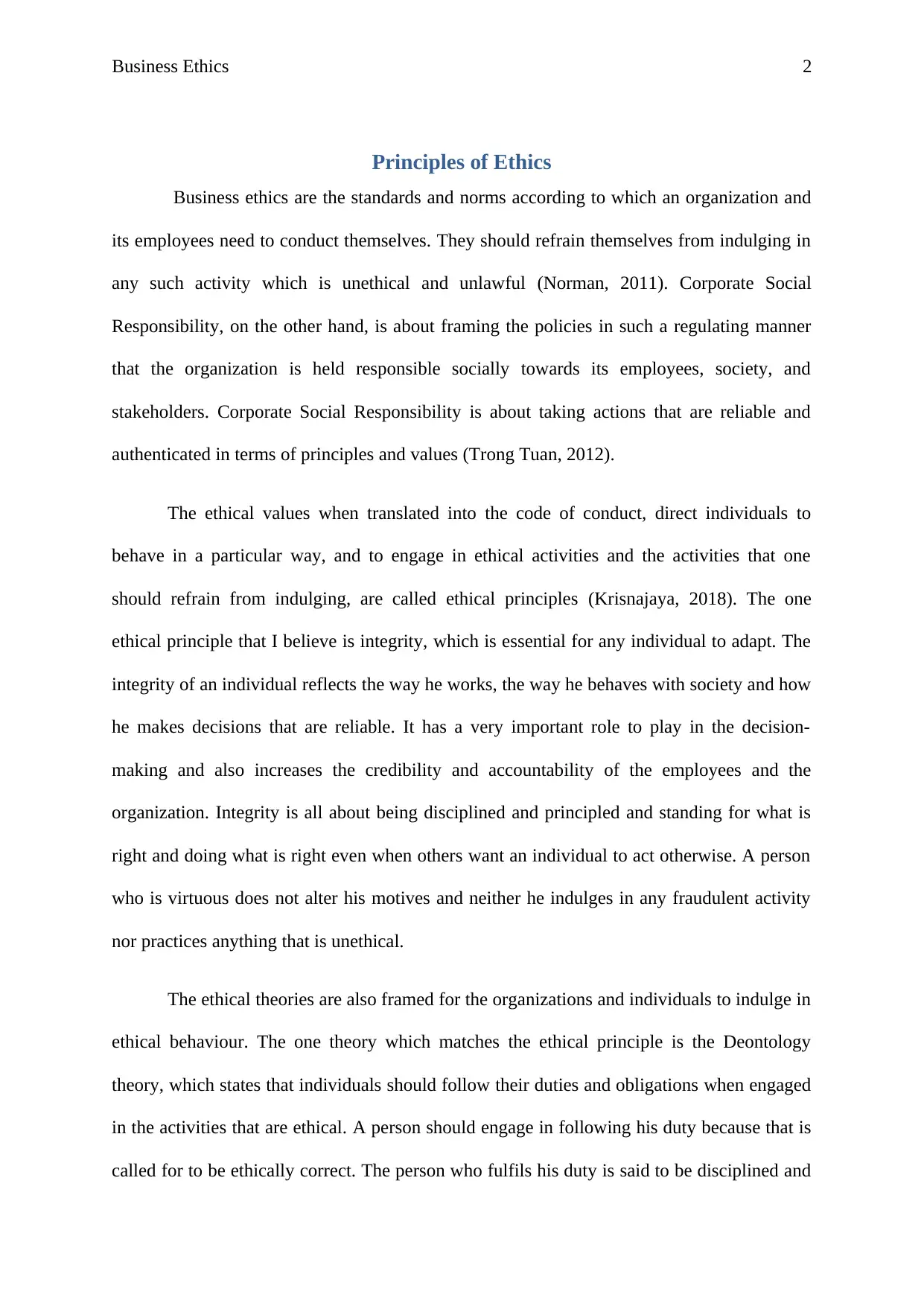
Business Ethics 2
Principles of Ethics
Business ethics are the standards and norms according to which an organization and
its employees need to conduct themselves. They should refrain themselves from indulging in
any such activity which is unethical and unlawful (Norman, 2011). Corporate Social
Responsibility, on the other hand, is about framing the policies in such a regulating manner
that the organization is held responsible socially towards its employees, society, and
stakeholders. Corporate Social Responsibility is about taking actions that are reliable and
authenticated in terms of principles and values (Trong Tuan, 2012).
The ethical values when translated into the code of conduct, direct individuals to
behave in a particular way, and to engage in ethical activities and the activities that one
should refrain from indulging, are called ethical principles (Krisnajaya, 2018). The one
ethical principle that I believe is integrity, which is essential for any individual to adapt. The
integrity of an individual reflects the way he works, the way he behaves with society and how
he makes decisions that are reliable. It has a very important role to play in the decision-
making and also increases the credibility and accountability of the employees and the
organization. Integrity is all about being disciplined and principled and standing for what is
right and doing what is right even when others want an individual to act otherwise. A person
who is virtuous does not alter his motives and neither he indulges in any fraudulent activity
nor practices anything that is unethical.
The ethical theories are also framed for the organizations and individuals to indulge in
ethical behaviour. The one theory which matches the ethical principle is the Deontology
theory, which states that individuals should follow their duties and obligations when engaged
in the activities that are ethical. A person should engage in following his duty because that is
called for to be ethically correct. The person who fulfils his duty is said to be disciplined and
Principles of Ethics
Business ethics are the standards and norms according to which an organization and
its employees need to conduct themselves. They should refrain themselves from indulging in
any such activity which is unethical and unlawful (Norman, 2011). Corporate Social
Responsibility, on the other hand, is about framing the policies in such a regulating manner
that the organization is held responsible socially towards its employees, society, and
stakeholders. Corporate Social Responsibility is about taking actions that are reliable and
authenticated in terms of principles and values (Trong Tuan, 2012).
The ethical values when translated into the code of conduct, direct individuals to
behave in a particular way, and to engage in ethical activities and the activities that one
should refrain from indulging, are called ethical principles (Krisnajaya, 2018). The one
ethical principle that I believe is integrity, which is essential for any individual to adapt. The
integrity of an individual reflects the way he works, the way he behaves with society and how
he makes decisions that are reliable. It has a very important role to play in the decision-
making and also increases the credibility and accountability of the employees and the
organization. Integrity is all about being disciplined and principled and standing for what is
right and doing what is right even when others want an individual to act otherwise. A person
who is virtuous does not alter his motives and neither he indulges in any fraudulent activity
nor practices anything that is unethical.
The ethical theories are also framed for the organizations and individuals to indulge in
ethical behaviour. The one theory which matches the ethical principle is the Deontology
theory, which states that individuals should follow their duties and obligations when engaged
in the activities that are ethical. A person should engage in following his duty because that is
called for to be ethically correct. The person who fulfils his duty is said to be disciplined and
⊘ This is a preview!⊘
Do you want full access?
Subscribe today to unlock all pages.

Trusted by 1+ million students worldwide
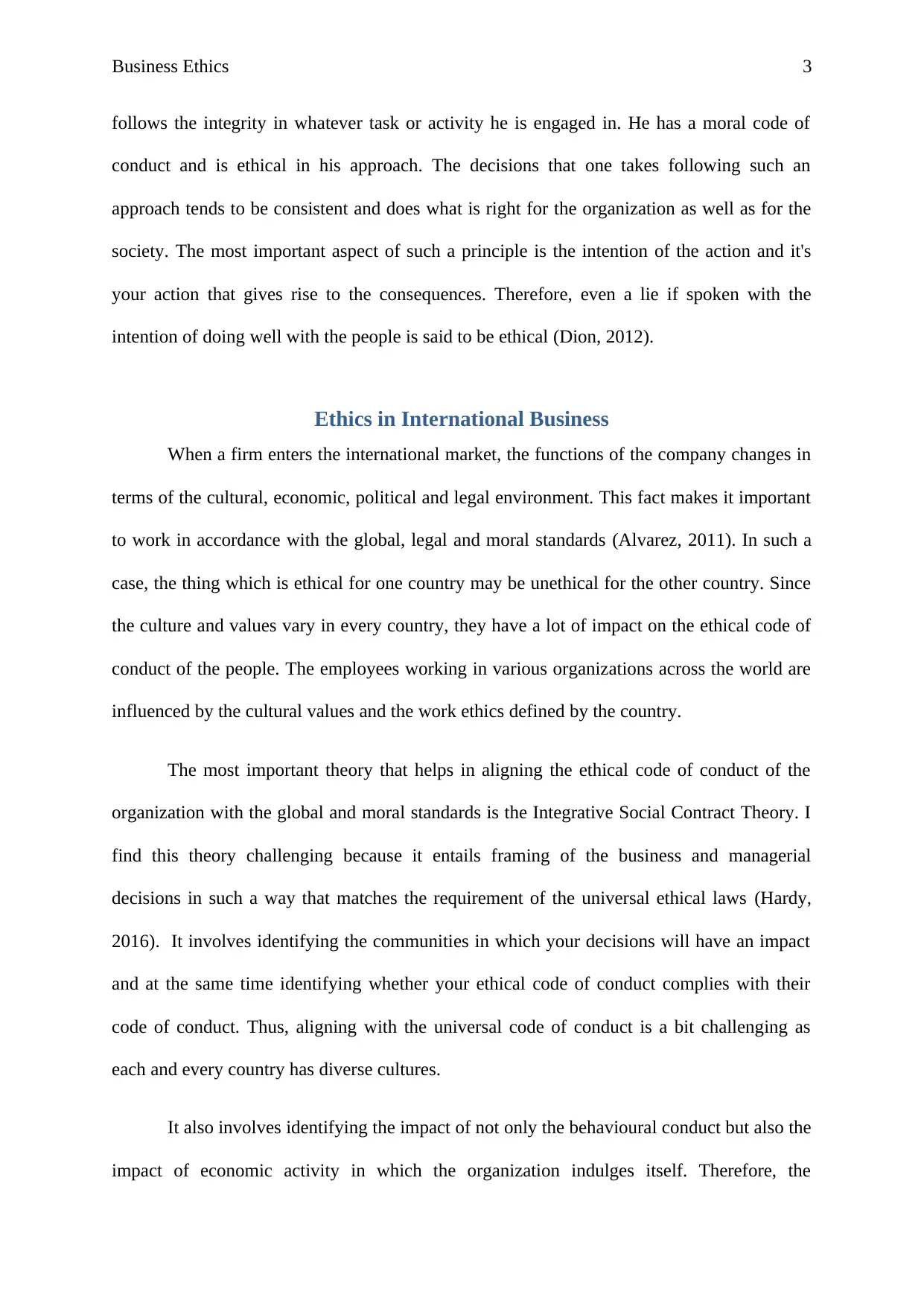
Business Ethics 3
follows the integrity in whatever task or activity he is engaged in. He has a moral code of
conduct and is ethical in his approach. The decisions that one takes following such an
approach tends to be consistent and does what is right for the organization as well as for the
society. The most important aspect of such a principle is the intention of the action and it's
your action that gives rise to the consequences. Therefore, even a lie if spoken with the
intention of doing well with the people is said to be ethical (Dion, 2012).
Ethics in International Business
When a firm enters the international market, the functions of the company changes in
terms of the cultural, economic, political and legal environment. This fact makes it important
to work in accordance with the global, legal and moral standards (Alvarez, 2011). In such a
case, the thing which is ethical for one country may be unethical for the other country. Since
the culture and values vary in every country, they have a lot of impact on the ethical code of
conduct of the people. The employees working in various organizations across the world are
influenced by the cultural values and the work ethics defined by the country.
The most important theory that helps in aligning the ethical code of conduct of the
organization with the global and moral standards is the Integrative Social Contract Theory. I
find this theory challenging because it entails framing of the business and managerial
decisions in such a way that matches the requirement of the universal ethical laws (Hardy,
2016). It involves identifying the communities in which your decisions will have an impact
and at the same time identifying whether your ethical code of conduct complies with their
code of conduct. Thus, aligning with the universal code of conduct is a bit challenging as
each and every country has diverse cultures.
It also involves identifying the impact of not only the behavioural conduct but also the
impact of economic activity in which the organization indulges itself. Therefore, the
follows the integrity in whatever task or activity he is engaged in. He has a moral code of
conduct and is ethical in his approach. The decisions that one takes following such an
approach tends to be consistent and does what is right for the organization as well as for the
society. The most important aspect of such a principle is the intention of the action and it's
your action that gives rise to the consequences. Therefore, even a lie if spoken with the
intention of doing well with the people is said to be ethical (Dion, 2012).
Ethics in International Business
When a firm enters the international market, the functions of the company changes in
terms of the cultural, economic, political and legal environment. This fact makes it important
to work in accordance with the global, legal and moral standards (Alvarez, 2011). In such a
case, the thing which is ethical for one country may be unethical for the other country. Since
the culture and values vary in every country, they have a lot of impact on the ethical code of
conduct of the people. The employees working in various organizations across the world are
influenced by the cultural values and the work ethics defined by the country.
The most important theory that helps in aligning the ethical code of conduct of the
organization with the global and moral standards is the Integrative Social Contract Theory. I
find this theory challenging because it entails framing of the business and managerial
decisions in such a way that matches the requirement of the universal ethical laws (Hardy,
2016). It involves identifying the communities in which your decisions will have an impact
and at the same time identifying whether your ethical code of conduct complies with their
code of conduct. Thus, aligning with the universal code of conduct is a bit challenging as
each and every country has diverse cultures.
It also involves identifying the impact of not only the behavioural conduct but also the
impact of economic activity in which the organization indulges itself. Therefore, the
Paraphrase This Document
Need a fresh take? Get an instant paraphrase of this document with our AI Paraphraser
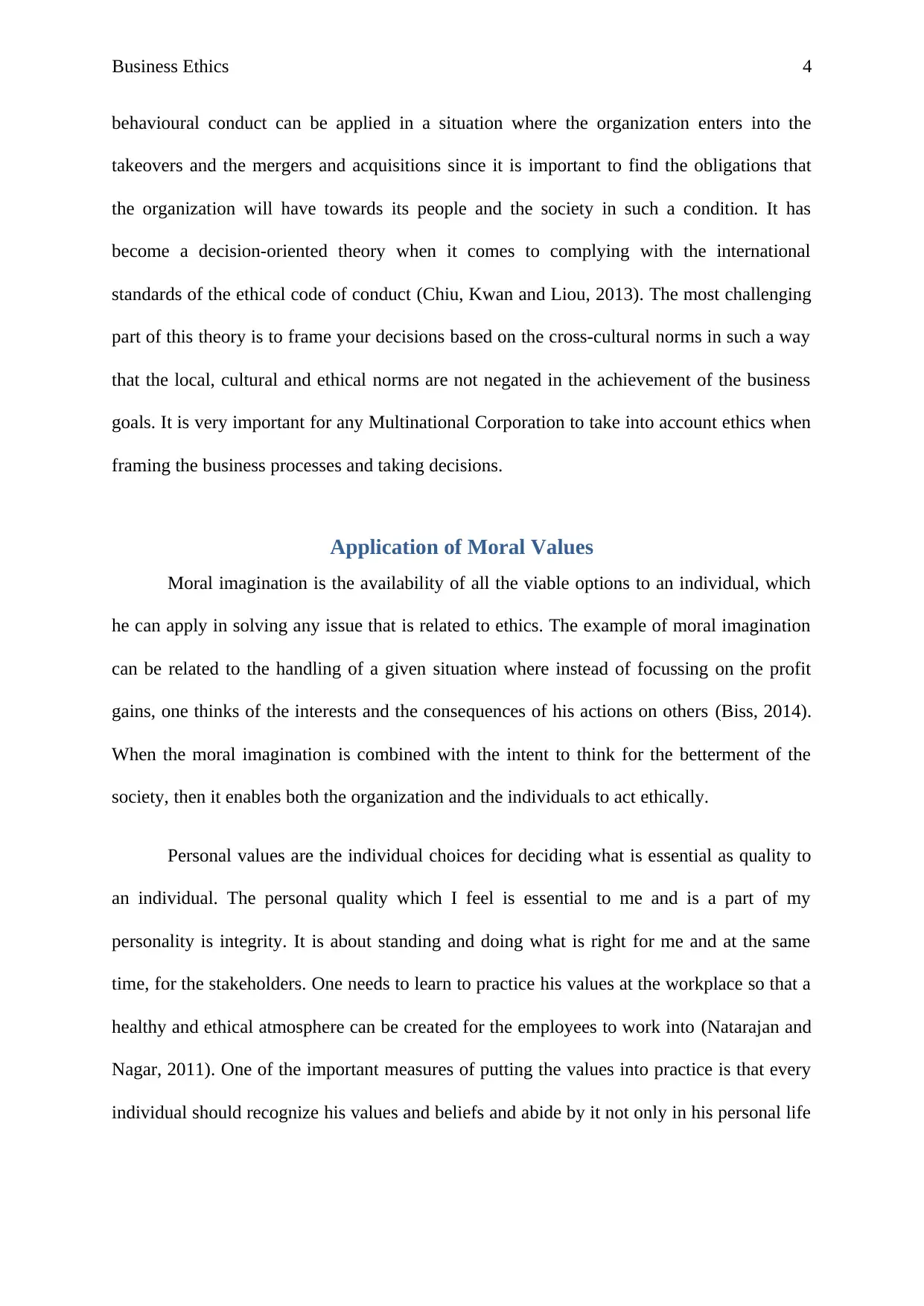
Business Ethics 4
behavioural conduct can be applied in a situation where the organization enters into the
takeovers and the mergers and acquisitions since it is important to find the obligations that
the organization will have towards its people and the society in such a condition. It has
become a decision-oriented theory when it comes to complying with the international
standards of the ethical code of conduct (Chiu, Kwan and Liou, 2013). The most challenging
part of this theory is to frame your decisions based on the cross-cultural norms in such a way
that the local, cultural and ethical norms are not negated in the achievement of the business
goals. It is very important for any Multinational Corporation to take into account ethics when
framing the business processes and taking decisions.
Application of Moral Values
Moral imagination is the availability of all the viable options to an individual, which
he can apply in solving any issue that is related to ethics. The example of moral imagination
can be related to the handling of a given situation where instead of focussing on the profit
gains, one thinks of the interests and the consequences of his actions on others (Biss, 2014).
When the moral imagination is combined with the intent to think for the betterment of the
society, then it enables both the organization and the individuals to act ethically.
Personal values are the individual choices for deciding what is essential as quality to
an individual. The personal quality which I feel is essential to me and is a part of my
personality is integrity. It is about standing and doing what is right for me and at the same
time, for the stakeholders. One needs to learn to practice his values at the workplace so that a
healthy and ethical atmosphere can be created for the employees to work into (Natarajan and
Nagar, 2011). One of the important measures of putting the values into practice is that every
individual should recognize his values and beliefs and abide by it not only in his personal life
behavioural conduct can be applied in a situation where the organization enters into the
takeovers and the mergers and acquisitions since it is important to find the obligations that
the organization will have towards its people and the society in such a condition. It has
become a decision-oriented theory when it comes to complying with the international
standards of the ethical code of conduct (Chiu, Kwan and Liou, 2013). The most challenging
part of this theory is to frame your decisions based on the cross-cultural norms in such a way
that the local, cultural and ethical norms are not negated in the achievement of the business
goals. It is very important for any Multinational Corporation to take into account ethics when
framing the business processes and taking decisions.
Application of Moral Values
Moral imagination is the availability of all the viable options to an individual, which
he can apply in solving any issue that is related to ethics. The example of moral imagination
can be related to the handling of a given situation where instead of focussing on the profit
gains, one thinks of the interests and the consequences of his actions on others (Biss, 2014).
When the moral imagination is combined with the intent to think for the betterment of the
society, then it enables both the organization and the individuals to act ethically.
Personal values are the individual choices for deciding what is essential as quality to
an individual. The personal quality which I feel is essential to me and is a part of my
personality is integrity. It is about standing and doing what is right for me and at the same
time, for the stakeholders. One needs to learn to practice his values at the workplace so that a
healthy and ethical atmosphere can be created for the employees to work into (Natarajan and
Nagar, 2011). One of the important measures of putting the values into practice is that every
individual should recognize his values and beliefs and abide by it not only in his personal life
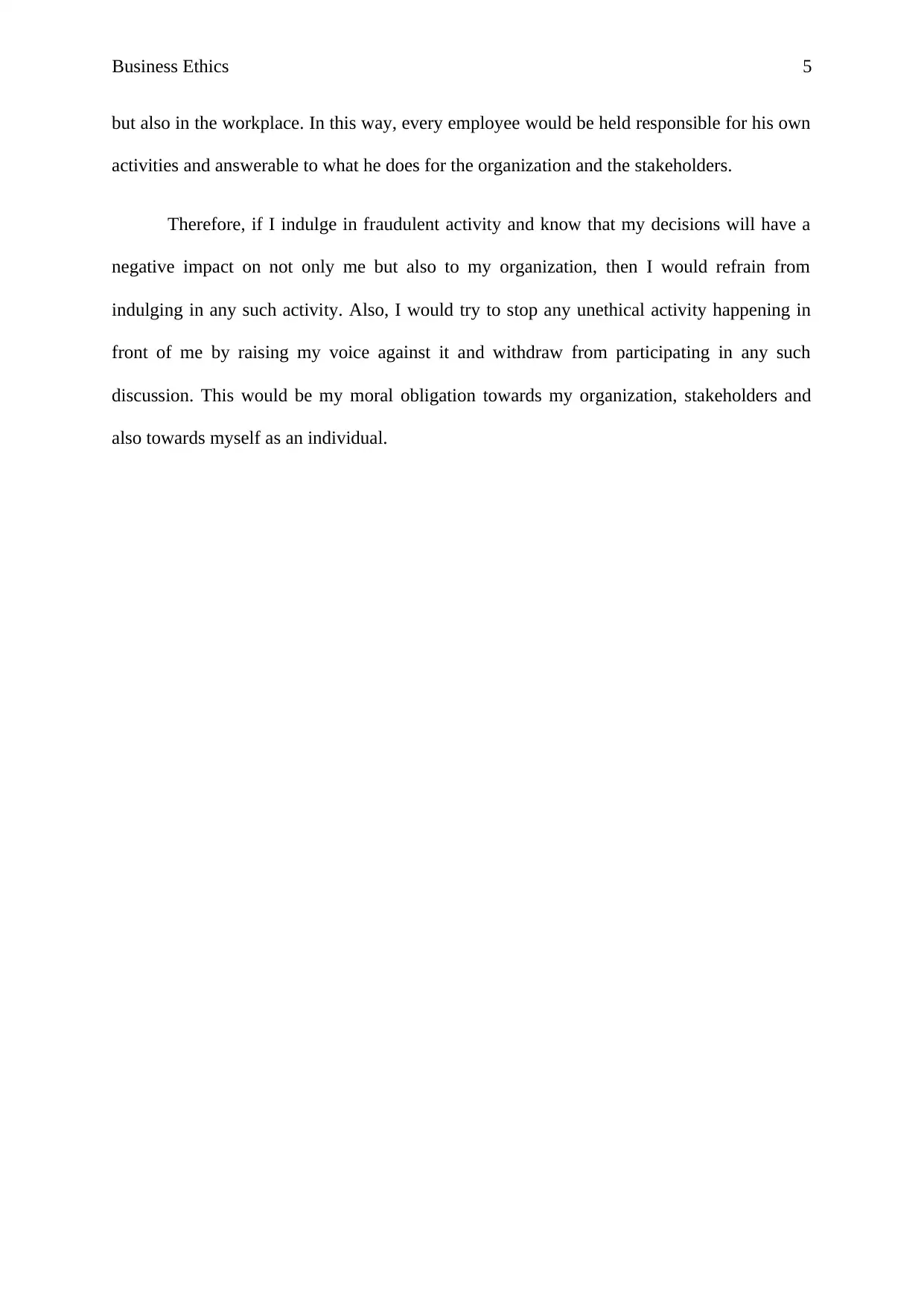
Business Ethics 5
but also in the workplace. In this way, every employee would be held responsible for his own
activities and answerable to what he does for the organization and the stakeholders.
Therefore, if I indulge in fraudulent activity and know that my decisions will have a
negative impact on not only me but also to my organization, then I would refrain from
indulging in any such activity. Also, I would try to stop any unethical activity happening in
front of me by raising my voice against it and withdraw from participating in any such
discussion. This would be my moral obligation towards my organization, stakeholders and
also towards myself as an individual.
but also in the workplace. In this way, every employee would be held responsible for his own
activities and answerable to what he does for the organization and the stakeholders.
Therefore, if I indulge in fraudulent activity and know that my decisions will have a
negative impact on not only me but also to my organization, then I would refrain from
indulging in any such activity. Also, I would try to stop any unethical activity happening in
front of me by raising my voice against it and withdraw from participating in any such
discussion. This would be my moral obligation towards my organization, stakeholders and
also towards myself as an individual.
⊘ This is a preview!⊘
Do you want full access?
Subscribe today to unlock all pages.

Trusted by 1+ million students worldwide
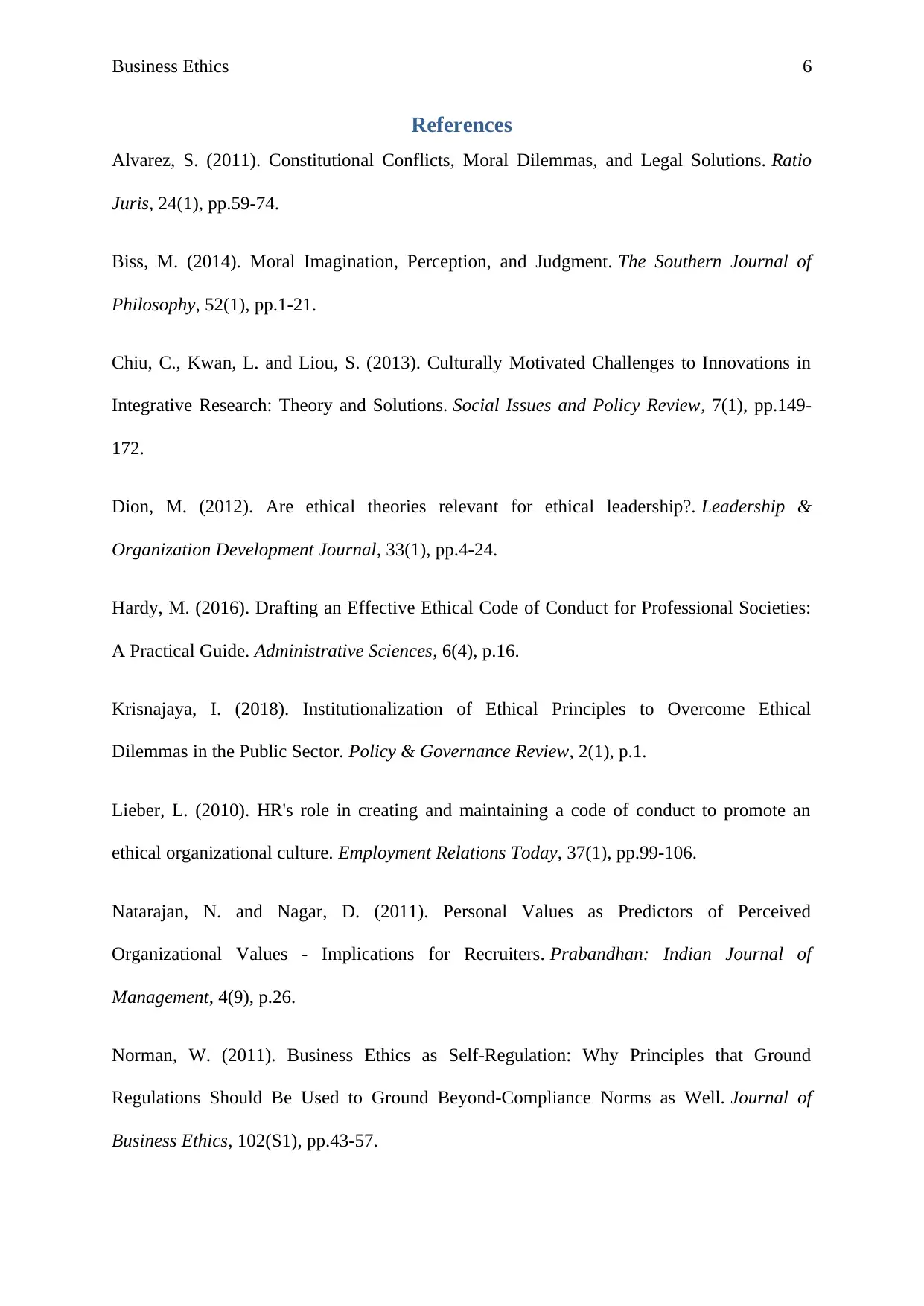
Business Ethics 6
References
Alvarez, S. (2011). Constitutional Conflicts, Moral Dilemmas, and Legal Solutions. Ratio
Juris, 24(1), pp.59-74.
Biss, M. (2014). Moral Imagination, Perception, and Judgment. The Southern Journal of
Philosophy, 52(1), pp.1-21.
Chiu, C., Kwan, L. and Liou, S. (2013). Culturally Motivated Challenges to Innovations in
Integrative Research: Theory and Solutions. Social Issues and Policy Review, 7(1), pp.149-
172.
Dion, M. (2012). Are ethical theories relevant for ethical leadership?. Leadership &
Organization Development Journal, 33(1), pp.4-24.
Hardy, M. (2016). Drafting an Effective Ethical Code of Conduct for Professional Societies:
A Practical Guide. Administrative Sciences, 6(4), p.16.
Krisnajaya, I. (2018). Institutionalization of Ethical Principles to Overcome Ethical
Dilemmas in the Public Sector. Policy & Governance Review, 2(1), p.1.
Lieber, L. (2010). HR's role in creating and maintaining a code of conduct to promote an
ethical organizational culture. Employment Relations Today, 37(1), pp.99-106.
Natarajan, N. and Nagar, D. (2011). Personal Values as Predictors of Perceived
Organizational Values - Implications for Recruiters. Prabandhan: Indian Journal of
Management, 4(9), p.26.
Norman, W. (2011). Business Ethics as Self-Regulation: Why Principles that Ground
Regulations Should Be Used to Ground Beyond-Compliance Norms as Well. Journal of
Business Ethics, 102(S1), pp.43-57.
References
Alvarez, S. (2011). Constitutional Conflicts, Moral Dilemmas, and Legal Solutions. Ratio
Juris, 24(1), pp.59-74.
Biss, M. (2014). Moral Imagination, Perception, and Judgment. The Southern Journal of
Philosophy, 52(1), pp.1-21.
Chiu, C., Kwan, L. and Liou, S. (2013). Culturally Motivated Challenges to Innovations in
Integrative Research: Theory and Solutions. Social Issues and Policy Review, 7(1), pp.149-
172.
Dion, M. (2012). Are ethical theories relevant for ethical leadership?. Leadership &
Organization Development Journal, 33(1), pp.4-24.
Hardy, M. (2016). Drafting an Effective Ethical Code of Conduct for Professional Societies:
A Practical Guide. Administrative Sciences, 6(4), p.16.
Krisnajaya, I. (2018). Institutionalization of Ethical Principles to Overcome Ethical
Dilemmas in the Public Sector. Policy & Governance Review, 2(1), p.1.
Lieber, L. (2010). HR's role in creating and maintaining a code of conduct to promote an
ethical organizational culture. Employment Relations Today, 37(1), pp.99-106.
Natarajan, N. and Nagar, D. (2011). Personal Values as Predictors of Perceived
Organizational Values - Implications for Recruiters. Prabandhan: Indian Journal of
Management, 4(9), p.26.
Norman, W. (2011). Business Ethics as Self-Regulation: Why Principles that Ground
Regulations Should Be Used to Ground Beyond-Compliance Norms as Well. Journal of
Business Ethics, 102(S1), pp.43-57.
Paraphrase This Document
Need a fresh take? Get an instant paraphrase of this document with our AI Paraphraser
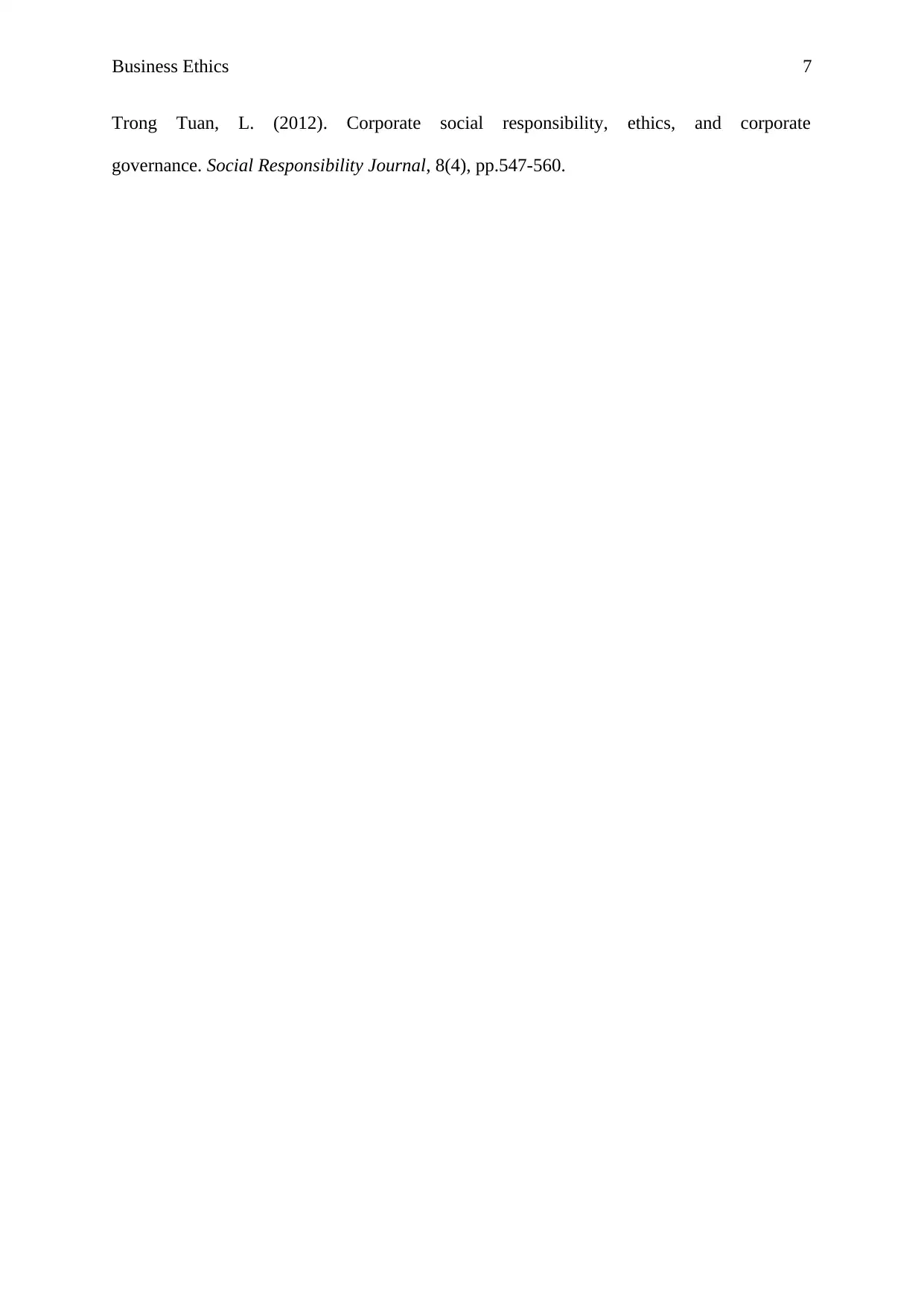
Business Ethics 7
Trong Tuan, L. (2012). Corporate social responsibility, ethics, and corporate
governance. Social Responsibility Journal, 8(4), pp.547-560.
Trong Tuan, L. (2012). Corporate social responsibility, ethics, and corporate
governance. Social Responsibility Journal, 8(4), pp.547-560.
1 out of 8
Related Documents
Your All-in-One AI-Powered Toolkit for Academic Success.
+13062052269
info@desklib.com
Available 24*7 on WhatsApp / Email
![[object Object]](/_next/static/media/star-bottom.7253800d.svg)
Unlock your academic potential
Copyright © 2020–2026 A2Z Services. All Rights Reserved. Developed and managed by ZUCOL.





